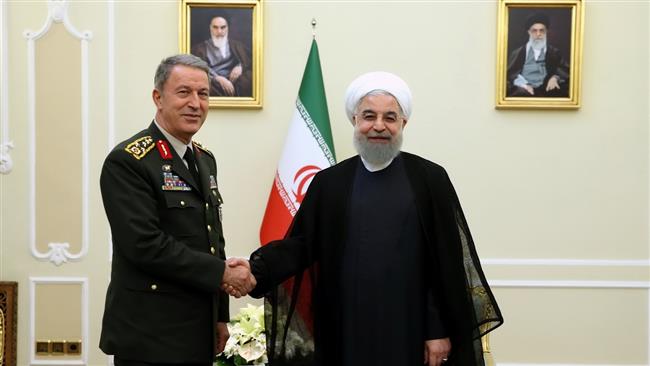Iran has shown its solidarity with Turkey after the September 25 referendum in which almost 93% of Iraqi Kurds voted for independence.
President Hassan Rouhani met Turkish Chief of General Staff Hulusi Akar on Monday, with both men declaring a stand after any Iraqi Kurdish breakaway from Baghdad.
Rouhani said, “Any change in geographical borders will cause insecurity and instability to spread throughout the region,” citing the need to bolster both the Iraqi central government and the Assad regime in Syria. He continued:
To do away with these threats and in line with [our] common interests, all-out relations and cooperation must further develop between Tehran and Ankara.
The armed forces of Iran and Turkey can establish constructive relations in order to repel regional threats through further expansion of cooperation and exchange of experience.
Akar arrived in Tehran late Sunday at the invitation of Iranian counterpart Maj. Gen. Mohammad Baqeri. In mid-August, Baqeri made the first visit by the head of the Iranian military since the 1979 Islamic Revolution.
Turkish President Recep Tayyip Erdoğan is scheduled to visit Iran soon.
Following the Iraqi Kurdish referendum, Iran has warned its companies against shipment of oil products to and from the area and announced joint military exercises with Iraq. The Iraqi Defence Ministry said on Friday that Baghdad plans to take control of the borders of Iraqi Kurdistan “in coordination” with Iran and Turkey.
While concerned about the referendum’s effect on Turkish Kurds, Ankara has been more cautious than Tehran in its actions. The Erdoğan administration has had generally good relations with the Iraqi Kurdish Regional Government and President Masoud Barzani, particularly in relation to Turkey’s perceived threat from the emerging Kurdish leadership in Syria’s 79-month conflict.
Turkey has not closed borders with Iraqi Kurdistan, and Erdoğan and Foreign Minister Mevlut Cavusoglu, have said “there is a way back” for Barzani to re-establish a positive relationship if he steps back from the “mistake” of the referendum.
However, Erdoğan told his ruling party on Tuesday that Turkey will impose further sanctions on the Kurdistan Regional Government: “We are managing with some embargoes in northern Iraq for now, but if they don’t come to their senses, this will continue increasingly.”
Kurdish Vote “Boosts Takfiri Terrorism”
While Rouhani put out measured rhetoric, other senior Iranian officials repeated declaration that the Iraqi Kurds had served the US, Israel, and “Takfiri terrorism” with their vote.
The Secretary of the National Security Council, Ali Shamkhani, told Akar:
Holding the referendum in Iraq’s Kurdistan will help the Western-Zionist-Arab front supporting Takfiri terrorism achieve its objectives and is definitely in contradiction to the interests of the Iraqi people, particularly the Kurds.
Maj. Gen. Baqeri said the two countries have “common and similar” positions that Iraq’s territorial integrity must be preserved.
In New York, as he closed a 12-day stay with a series of media interviews, Foreign Minister Mohammad Javad Zarif called on Iraqi Kurdish leaders to set aside the vote and discuss matters with Baghdad:
Our expectation is that negotiations begin with respect to Iraq’s Constitution, especially Article 1, which lays emphasis on Iraq’s national unity and territorial integrity as irreplaceable principles, with recent happenings having no effect on negotiations or the future.

